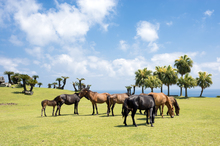Summer has arrived! Temperatures are up, sweat is dripping, and insects are swarming all over. While the warm weather offers great opportunities to work with your horse, it also brings certain horse-care challenges. Consider the following summertime horse-management tips from the equine nutrition experts at Kentucky Equine Research (KER).

Summer heat - Not a horse's best friend
While the warm weather offers great opportunities to work with your horse, it also brings certain horse-care challenges.
Heat - Temperatures are capable of soaring past 100 degrees on summer days. As the mercury creeps up, horse owners must fine-tune certain facets of management, including provision of shade and plenty of fresh drinking water. Read more to help your horse beat the heat:
- Hot Weather Hazard for Horses
- Checking for Dehydration in Horses
- Summer Pasture-Associated Heaves
- Keeping Horses Cool in Hot Weather
Sweat - Sweating is the only way horses have to dissipate body heat. Unlike dogs, horses canât pant to cool off! Some horses even experience issues with sweating. Learn more about your horseâs sweat:
- Watery or Lathered: Differences in Horse Sweat
- Anhidrosis in Horses and Electrolyte Therapy
- Electrolytes and Performance Horses: Is a Salt Block Enough?
- Dietary Sources of Potassium for Horses
Skin - Despite the short, tight hair coats characteristic of summertime, problems still pop up in the skin, hair, and hooves of horses. Keep an eye on coat and hoof health through daily grooming and hoof-picking. Read more to keep your horse comfortable this summer:
- Feeding for Sound Summer Hooves
- Hoof Rings in Horses: What Do They Mean?
- Maintaining Coat Health of Horses: Grooming, Bathing, and Feeding
- Skin Problems in Horses: Culicoides Hypersensitivity
- Common Skin Problems in Horses
Foals - As foaling season comes to an end, fruits of the breedersâ labors are on full display, but foals are just as, if not more, vulnerable to health problems as their mature horses. Foal caretakers know that several once-overs a day will keep illness away. Keep your foal healthy with these tips:
- The Young Years: Nutrition from Birth to Two Years of Age
- Foal Diarrhea: Look to Nutritional Supplements for Help
- Estimating a Foalâs Mature Height
- Keep an Eye on Foal Halters
- Foal Dribbling Urine: Patent Urachus
- Rhodococcus equi Infection in Foals
For more seasonal tips like these, subscribe to Seasonal Spotlight, a quarterly mailing full of timely information on equine nutrition and health. Seasonal Spotlight won the Business Equine-Related eNewsletter award at the 2015 American Horse Publications (AHP) Equine Media Awards. KER also offers The Weekly Feed, a previous AHP winner delivering the most recent headlines in equine nutrition every week.
About Kentucky Equine Research
Kentucky Equine Research (KER) is an international equine nutrition, research and consultation company serving both the horse producer and the feed industry. Its goal is to advance the industry's knowledge of equine nutrition and exercise physiology and apply this knowledge to produce healthier, more athletic horses. For more information, see www.ker.com or call 888-873-1988.
